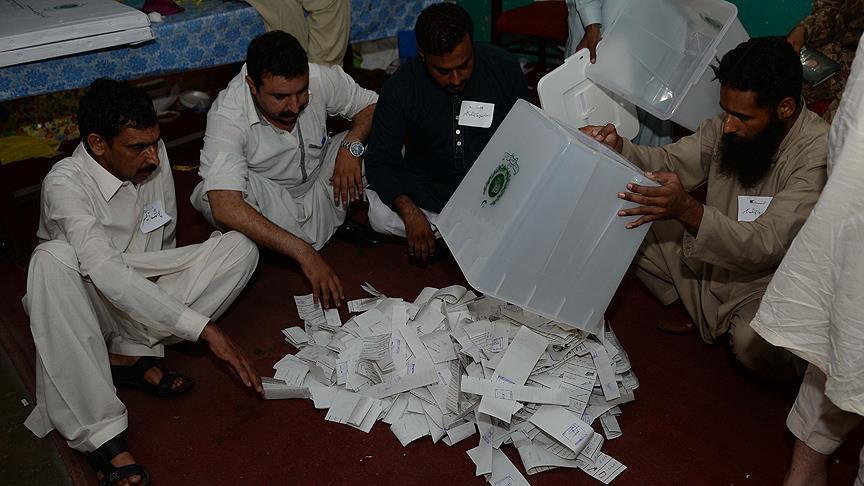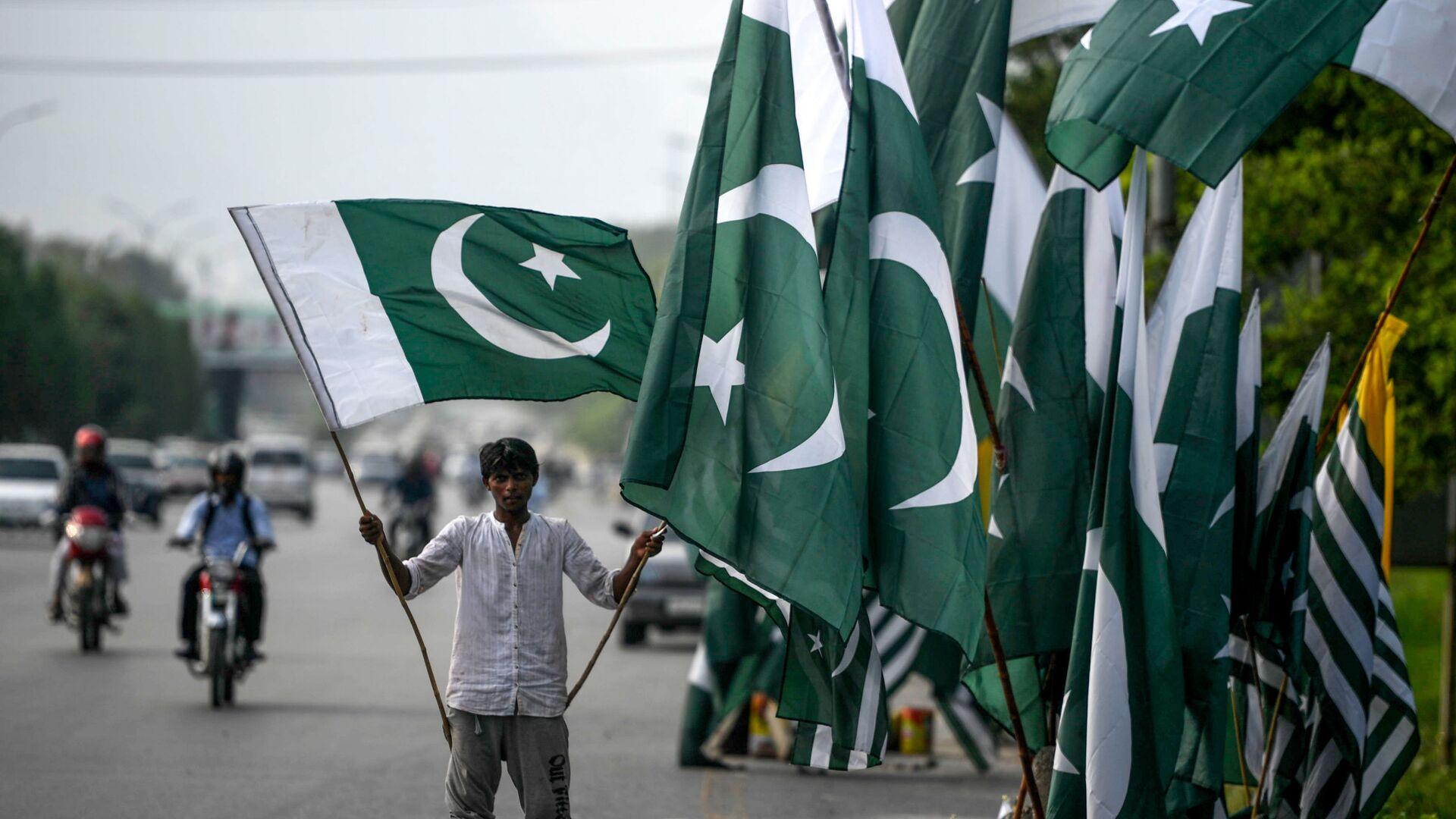Ex-ministers cross swords as intrigue mounts over formation of Pakistan government Shehbaz Sharif vs Imran Khan
In the wake of Pakistan's general election, intrigue is running high. Who will form the government? And what will happen to the region? Questions remain over the new prime minister and his cabinet's composition.
Terrorists against peaceful election
Anwar-ul-Haq Kakar, head of Pakistan's caretaker government, summed up the results of the February 8 National Assembly elections at a press conference in Islamabad on February 12. The caretaker Prime Minister welcomed the continued democratic rule.
Violence in the provinces of Balochistan and Khyber Pakhtunkhwa exacerbated the difficult environment in which the elections were held. On February 7, a bomb exploded as independent candidate Asfar Khan Kakar was meeting voters in Pishin (100km from the Afghan border). On Wednesday, another bomb exploded outside a polling station in Killa Saifullah. Twenty-eight people were killed in these attacks. Earlier, in late January, independent candidate Rehan Zeb Khan was killed and a Pakistan People's Party (PPP) candidate was assassinated. There were also allegations that polling stations in North Waziristan could be overrun by the Taliban. As a security measure, mobile phones were switched off in the run-up to the elections, and there was some delay in announcing the results.
The head of the interim government said that Pakistan's security forces had played an important role in ensuring peaceful elections. According to him, there was no discussion with Pakistan's army chief about the election process and no pressure on the civilian authorities and election commissions. Anwar-ul-Haq Kakar also rejected all attempts at external pressure, saying: 'We will not conduct investigations into alleged rigging at the behest of any country'.
At the same time, he said that it was the constitutional right of Pakistani citizens to protest against the election results, but that the government would not tolerate anarchy in the country.
Voter turnout in the current elections was 48 per cent, down from 51 per cent in 2018. However, the election was characterised by a high level of youth participation, with 44 per cent of voters under the age of 35. A large number of women also turned out to vote.
Parliamentary independence
Former Prime Minister Shehbaz Sharif's conservative right-wing Pakistan Muslim League (PML-N) won 75 seats in parliament. The centre-left Pakistan People's Party (PPP) of Bilawal Bhutto Zardari (son of assassinated prime minister Benazir Bhutto) came second with 54 seats. The Muttahida Qaumi Movement (MQM), a social-liberal movement, has 17 seats.

There are now 265 seats in the Pakistani parliament. In one constituency the election was postponed due to the death of a candidate, while in another the results have not yet been announced.
This means that Shehbaz Sharif will need to form a coalition with other parties and independent MPs to form a government. Shehbaz Sharif has already announced his willingness to work with other political parties in parliament, saying: "We invite them to sit at the same table with us and help this wounded nation stand on its feet".
But what makes this election special is that independent candidates won the most seats - 101 mandates. And 93 of them actually represent the centrist Movement for Justice Party (MJP, Tehreek-e-Insaf), the party of another former prime minister, Imran Khan. The Supreme Court barred the Tehreek-e-Insaf from contesting the general election because it did not hold "intra-party elections" and its candidates ran as "independents". Tehreek-e-Insaf leader Imran Khan himself is in prison on charges of corruption, leaking state secrets and marriage offences. At the same time, Imran Khan refused to accept Sharif's victory and congratulated his voters. His supporters are contesting parliamentary seats in several constituencies. The 71-year-old politician also urged his supporters to "protect their votes".
Some leaders of the People's Party-led bloc have also spoken out against the results and called for street protests. But Shehbaz Sharif also accused his opponents of rigging the results in a number of constituencies they controlled.
Sit-ins, demonstrations and other peaceful protests took place in various parts of the country. Protesters blocked highways in the provinces of Balochistan and North Waziristan.
The remaining seats went to smaller parties. The Jamaat-e-Islami won four seats, the Muslim League (K) won three seats, the Pakistan Stability Party won two seats and the Balochistan National Party won two seats. Majlis Wahdat al-Muslimeen, Zia Muslim League, Awami Pakhtunkhwa National Party, Balochistan Awami Party, National Party and Pakhtunkhwa Milli Awami Party got 1 mandate each.
Shehbaz Sharif's party has made no bones about saying it got less than it expected to get. PML-N Punjab leader Rana Sanaullah said that high inflation had affected voter sentiment and that the party's representatives had failed to convince people that it was not their fault.
Among the newly elected members of the National Assembly are 12 women who were elected on a general basis. They include 5 independent candidates who were actually nominated by Tehreek-e-Insaf, 4 from the Muslim League, 2 from the People's Party and one woman from the Muttahida Qaumi Movement. Women's participation in elections has traditionally been opposed by religious extremists.
Bloc of parties and independents
Shehbaz Sharif has already started to build a coalition for his future government. A number of independent lawmakers were invited to a meeting at the former prime minister's residence. As a result, five independent MPs have already announced their intention to join the PML-N. While congratulating them for joining the party, Shehbaz Sharif said: "I appreciate your spirit. You have become part of the caravan to beautify Pakistan and save the nation from hardship".
There are also reports that MP Wasim Qadir of Imran Khan's Tehreek-e-Insaf party has also joined Shehbaz Sharif's party.
Shehbaz Sharif has declared his intention to hold talks with other parties but refuses to negotiate with Imran Khan's party. Sharif has also agreed to join the opposition if the government can be formed by independent MPs.
Things are more complicated for Tehreek-e-Insaf, which holds the largest number of seats in the National Assembly. Its current leader, Barrister Gohar Ali Khan, has said he has no intention of uniting with anyone and will remain in opposition. Pakistani law does not allow independent MPs to form an official parliamentary group. Theoretically, Imran Khan's supporters have one way out - to join another parliamentary party. In this case, Tehreek-e-Insaf supporters can also count on additional reserved seats for women and national minorities in the national and provincial assemblies.
In this context, there have been reports that the 'independent' lawmakers could join the Jamaat-e-Islami party. However, Gohar Ali Khan denied such speculation, saying that no party had approached him with such a proposal.
However, the possibility of Khan's supporters joining the Majlis Wahdat al-Muslimeen party has also been under discussion. This small party won one seat in parliament, but much more will now depend on it in Pakistani politics. Meanwhile, the leader of Majlis Wahdat al-Muslimeen, Raja Nasir Abbas, has already said that he is ready to offer his party to Tehreek-e-Insaf "unconditionally". Khan's own party has said it is willing to consider this option, but will still try to keep Tehreek-e-Insaf alive through the courts.

It should be noted that Majlis Wahdat al-Muslimin is a Shia party while Tehrik-e-Insaf is a Sunni political organisation. Traditionally, Shias in Pakistan have voted for the People's Party. Recently, however, the anti-Western Imran Khan has made frequent references to Iran's Islamic revolution in his speeches, attracting some of Pakistan's Shia. Islamabad's cooperation with China, including through the China-Pakistan Economic Corridor and special economic zones, is also flourishing.
A week before the general elections, Awami Party leader Bilawal Bhutto Zardari met with the leadership of Tehreek-e-Nifaz Fiqh Jafaria, another influential Shia organisation, and received its support in the elections.
A major problem for Tehreek-e-Insaf is its uneasy relationship with the Pakistani military.
Resisting polarisation
According to the constitution, the first session of Pakistan's new National Assembly must be convened by February 29. A total of 169 votes are required to elect a new prime minister. The Muslim League has already held several meetings with the leadership of the Awami Party, but no agreement has been reached on a government alliance.
Many pundits were inclined to believe that a coalition government of the Muslim League, the Awami Party and the Muttahida Qaumi Movement (MQM) led by Shehbaz Sharif could be formed, but with a strong parliamentary opposition. Shehbaz Sharif's previous government also included the Muslim League (K) and regional parties.
Imran Khan, for his part, doubts the Muslim League's ability to form a coalition government. At the same time, the founder of Tehreek-e-Insaf is actively holding meetings in prison with politicians from his party and with journalists. He told the latter that his party's candidate for prime minister had not yet been approved. Imran Khan also denied reports that he had held meetings with senior officials in jail. He also denied reports of his imminent transfer from jail to his personal residence. Earlier today, new cases were filed against Imran Khan and some of his party colleagues, but the court adjourned them to February 28.
On February 13 night, Nawaz Sharif's party and its allies announced that they would form a coalition government together, ending the uncertainty since last week when no party won a simple majority in the general elections. It appears that Shehbaz Sharif will once again be Pakistan's prime minister.
What is certain is that the new government, whatever its political makeup, will have many complex financial and economic issues to resolve. In particular, Shehbaz Sharif, who is seen as more pro-Western, talks about needing to borrow from the International Monetary Fund, while Imran Khan says going to the IMF won't help. Another particularly acute issue is the fight against terrorism, which has increased dramatically in recent times.
Time will tell how sustainable and effective the new coalition government will be. Pakistan's army chief also congratulated the country's people on a successful election. He said the state needed "a stable hand to move away from anarchy and polarisation".








